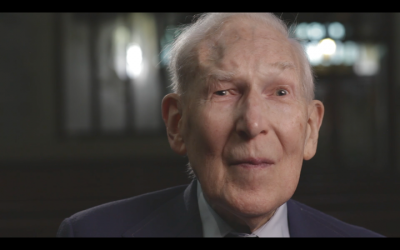|
As readers trek through the book of Exodus, one of the issues that causes many to scratch their heads is the hardening of Pharaoh’s heart.
We read about this hardening of Pharaoh’s heart in Exodus 7:1-5. In this passage, God tells Moses, “I will harden Pharaoh’s heart” (v. 3). Despite the signs that God performs in Egypt, Pharaoh will not listen to the message that Moses and his brother, Aaron, bring. God will nevertheless deliver His people from slavery, with this stated result: “And the Egyptians will know that I am the LORD when I stretch out my hand against Egypt and bring the Israelites out of it” (v. 5). Pharaoh’s hard-heartedness then remains a theme throughout this section of Exodus. There are times when Pharaoh’s heart is simply described as “hard” or “unyielding” (Exodus 7:14, 22; 8:19; 9:7). There are times when Exodus records that Pharaoh hardened his heart (Exodus 8:15, 32; 9:34) And there are times when we’re told that the LORD hardens Pharaoh’s heart (Exodus 4:21; 7:3; 9:12; 10:20, 27; 11:10). How should we think about this hardening of Pharaoh’s heart?
0 Comments
I love Psalm 1. It grabs me every time I read it. The picture is paints for us is attractive and compelling - just listen to this selection from the first three verses: Blessed is the one… whose delight is in the law of the Lord, and who meditates on his law day and night. That person is like a tree planted by streams of water, which yields its fruit in season and whose leaf does not wither - whatever they do prospers. Most people I talk with (including myself!) are drawn to the sort of life we see pictured here. We're drawn to the flourishing and the fruitfulness the psalm depicts. But we also need to take careful note of HOW this sort of full life is cultivated . We see an answer in the selection I've included above - we need to meditate on the Bible. A life that is full of God's Word will flourish in all the right ways and bear fruit for God.
So if meditation is such a big deal, what IS biblical meditation? If you've ever spent any time studying/looking into eschatology ("the study of last things"), you know Christians like to discuss and develop a case for different views on something called "the Millennium." There are postmillennials who believe Christ will physically return AFTER a "millennial age" of peace and righteousness, where the progress of the gospel has such a noticeable influence that more and more of society operates on God's standards. Premillennials believe that Christ will return BEFORE His millennial reign on earth, and that His arrival will institute this period of wholeness and righteousness. Amillennials believe that Christ's millennial reign is realized now in the church age, as Christ reigns from His throne currently. (The disclaimer, of course, is that these definitions are broad and somewhat simplistic. For a more nuanced description of each of these views and interaction among those who hold them, check out this "An Evening of Eschatology" with Drs. Jim Hamilton, Sam Storms, and Doug Wilson hosted by DesiringGod in 2009. It's worth a watch when you have an extra ) It is true that different millennial views have their place in a Christian theology of last things - I'm a firm believer in that. However, I'm also a firm believe that one's millennial views are NOT a litmus test for evangelical orthodoxy. A Christian can hold to any of the above-mentioned millennial views and still be an evangelical. It's in that vein that I include this picture that I first ran across a while ago. Even while we think theologically and debate issues, let's keep things in their proper place and be willing to have some fun doing so. If you like this post, you may also be interested in...
The platypus is a fascinating animal that defies easy description. National Geographic says the platypus is a "hodgepodge of more familiar species." It's a mammal that lays eggs. It's got a bill like a duck, a tail like a beaver, and fur like an otter. Oh yeah, and males are venomous. (And, if you watch Phineas and Ferb with your kids, you know that the platypus can also be a crime-fighting superhero pet like Perry. Amazing.) So the platypus has characteristics that resemble all these other species, and yet it can't be reduced to any one of these other species. The platypus is like a duck (in that it has a bill), but it's not a duck. The platypus is like a beaver (check out its tail), but it's not a beaver.
As I think about the church, I find it helpful to compare it to the platypus. Theology never stays abstract. What we believe should and must shape who we are.
Earlier this month I posted how theologian Wayne Grudem is one example of "theology taking shape" as he responds to and lives in light of his recent diagnosis of Parkinson's disease. Not long after I posted that, I learned that theologian J.I. Packer is ending his "formal ministry" of writing and regular preaching due to his failing eyesight. I've posted on J.I. Packer before (check out some of the posts here and here), and his Knowing God is one of the books I return to repeatedly. Packer is the first formal theologian that gave me a taste for all that the study of theology offers the Church and the individual Christian. Therefore, I was all ears as I read through a Gospel Coalition interview with J.I. Packer about his failing eyesight and what that means. Here's a link to the interview. I encourage you to take some time in the next day or so (or right now) and read through what Packer has to say, and how he's one more example of "theology" taking shape. And don't just read it. Reflect on it. Learn from it. Absorb it. Earlier this week, Jack Archer (Brookside's Director of Middle School Ministries) made me aware of a couple of great videos on the book of Genesis - one on Genesis 1-11, and a second on Genesis 12-50. Each video is approximately 5 min long. For everyone tracking along with Brookside Church and the "365 Bible Reading Plan," you know that we're coming up on the end of Genesis in our daily reading. These videos can help you review the book and keep the big picture in mind. One more thing: These videos were produced by the Bible Project. If you like the videos, you can learn more about who they are and check out more of what they're doing here. My oldest brother has started something of a "tradition" for his kids' birthdays when family gets together to celebrate - piñatas. He gets a piñata, and then all the cousins line up and do the "piñata thing": they put on a blindfold, grab a blunt stick, everyone backs away out of swinging distance, and the child takes a few swings in the hopes of connecting with the piñata and getting some candy. After plenty of whiffs and unsuccessful attempts, someone finally makes a crack in the piñata and all the kids rush forward for a no-holds-barred struggle for tootsie roll pops, snack-sized candy bars, and gum.
I wonder how often our attempts at spiritual formation - Christian growth - are something like this scenario I just described. We don't really have a clear picture of the target we're aiming for (like being blindfolded with a piñata in front of us), and so we exert a lot of effort and swing wildly in hopes that we'll connect with something - knowing that when (or better, if) we actually make contact we'll get something worthwhile. The process can feel unguided, discouraging, and exhausting. I don't think it has to be this way. As we'll see, Scripture gives us a clear picture of our "target" - we're not swinging blindly. That will be the focus of this post. And neither is our "tool" a blunt stick that's not designed for what it's being used for. There are plenty of good books out there that help us grow in our understanding and practice of spiritual disciplines - not as an end-in-themselves, but as divinely-appointed means by which we can authentically grow in Christ-likness. Let's now hone in on the focus of this post: What is the picture of spiritual formation we're pursuing? As we practice godly disciplines over the course of our lifetimes, what should they be cultivating? Earlier this week I was reading Genesis 27:20. Isaac is asking his son how the food that was being prepared for him got there so quickly. Here's the verse: Isaac asked his son, “How did you find it so quickly, my son?” “The Lord your God gave me success,” he replied. (Genesis 27:20) Taken by itself, the verse seems pretty straightforward. Isaac asks his son a question, and his son answers. Jacob (the son) acknowledges God and credits success to the LORD. This response sounds pretty good, right? WRONG. The larger context of this story (check it out in Genesis 27:1-41) shows us that this answer is heavy with deceit. Isaac thinks he's talking to his OTHER son, Esau, but Jacob tricks his father into thinking he is Esau. The motive for this deceit is that Jacob might "steal" his brother's blessing (and blessings were a BIG deal). This deceit was premeditated and organized. And what I find so scary about this passage is that in the middle of this known, willful, organized deceit, Jacob invokes religious language. Jacob "says the right thing" by crediting God, even though he's in the middle of sin. In other words, Jacob uses theological language but he doesn't mean any of it. Jacob references God casually, as a means to his own ends. Let me go right to the lesson: It's possible to use theological language - about God or anything else - carelessly and for selfish ends. Jacob's story shouldn't scare us away from theology, but it should alerts us to the possibility - the possibility within all of us - to "say the right thing" casually and manipulatively. We can "say the right thing" but mean none of it. Let's learn from Jacob's bad example and be careful to use theology not as a means to our own gain, but as a means to grow in our communion with God and our glad submission to Him. If you liked this post, you may also be interested in:
I'm a fan of Wayne Grudem. I've personally benefited tremendously from his books - so much so that I've required his Systematic Theology and Bible Doctrine as reading for various classes I've taught. I've heard him speak a handful of times at the Evangelical Theological Society, and appreciate both his content and his tone. I attended Trinity Evangelical Divinity School shortly after he left, but was there close enough to his tenure there that I heard from numerous others who were impacted by his teaching. Few contemporary evangelical systematic theologians are as influential as Wayne Grudem has been.
And my respect for Wayne Grudem continued to increase when I heard that he's been diagnosed with Parkinson's Disease, and read how he's responding to it. I've included a link to this response at the end of this post. Folks, this is an lived-example of theology taking shape and making a difference in everyday life. This is an embodied example of "theology matters." We all need examples like this. Check out what Wayne Grudem has to say here: "I Have Parkinson's and I am at Peace" by Wayne Grudem Many of you have heard the acronym "FOMO" (Fear Of Missing Out) - an anxiety or fear that something is going on somewhere that you're missing out on. Well, have no fear. In case you're experiencing "Brookside Institute FOMO," I've helpfully included all of the "top 5 blog posts" for each month, for the last six months (July-December 2015). If you're brand new to the Brookside Institute, be sure and check out our "About" page, our "Classes Overview," and our most recent "Speed Dating the Brookside Institute" as well.
Click on any of the posts included below to revisit posts you've already enjoyed and catch up on anything you may have missed! |
Tim WiebeChristian. Husband. Father. Pastor. Learner. Contributor. Reader. Categories
All
Archives
June 2024
|
© 2014-2024 | 11607 M Circle, Omaha NE, 68137 | www.thebrooksideinstitute.net










 RSS Feed
RSS Feed
